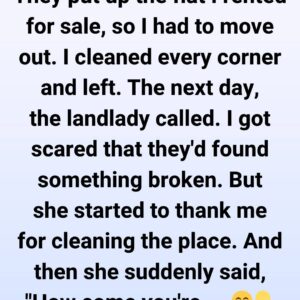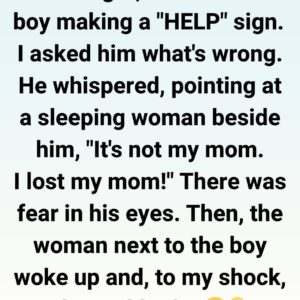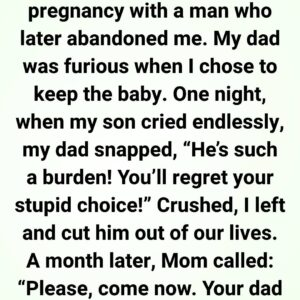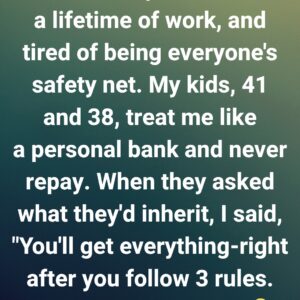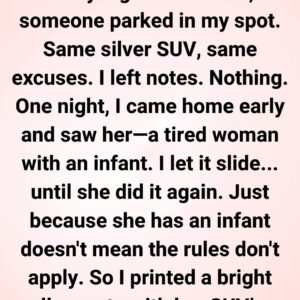The phone rang on my 20th birthday. I remember because I was microwaving leftover pizza in my dorm kitchen, still in my pajamas, nursing the kind of hangover that only comes from cheap wine and bittersweet milestones. The number on the screen was unfamiliar, out of state. I almost ignored it.
But something in me paused. Then I picked up.
“Lina,” the voice said, cautious but deliberate. “I’m your father.”
Seventeen years. Seventeen years of silence, of birthdays missed, of empty chairs at school plays and dance recitals. And now, out of nowhere, he was calling—not to apologize, not to explain—but to ask something of me.
All my life, it had been easier to pretend he was dead. The alternative was harder to swallow: that he had walked away on purpose. That he’d chosen absence. And that his disappearance from our lives wasn’t some tragic accident—but a decision.
My mom never talked much about him unless I asked. I knew she’d met him after his first divorce. At first, things had been beautiful. He used to bring her sunflowers and spin her around in the kitchen like some scene from an old romantic film. When I was born, the love didn’t seem to fade. There were photos—him cradling me in his arms, his face lit with pride.
But everything changed when she got pregnant with my younger sister, Stacey.
“He just… shut down,” Mom once told me. “Stopped talking. Started coming home late. Wouldn’t even look at my belly.”
She blamed stress. Hormones. Fear. But deep down, she knew something darker was brewing. When Stacey was born, he wasn’t at the hospital. He didn’t answer his phone. Didn’t respond to messages.
When she finally came home—with a newborn in her arms and a toddler trailing behind—his things were gone. The closet half-empty. His toothbrush missing. The silence in the house was louder than any slammed door.
A neighbor drove us home that day. And from that moment on, Mom did it all. She worked two jobs, came home exhausted, helped with homework, made pancakes on birthdays, cried in the shower. But she never once made us feel like we were burdens.
Still, there was a void. A dad-shaped absence that grew larger with every milestone he missed. Every Father’s Day craft I pretended not to care about. Every time Stacey asked, “Why don’t we have a daddy like the other kids?”
That phone call—on my 20th birthday—shattered the silence I’d come to accept.
“I’ve been trying to find you,” he said. “I wanted to wish you a happy birthday. Maybe we could meet?”
Against my better judgment, I said yes. Maybe because a part of me still wanted answers. Maybe because I needed to look him in the eyes and ask the one question that haunted me since I was a kid: Why weren’t we enough?
We agreed to meet at Tony’s Place, a small diner on Fifth Street that Mom used to take us to for “fancy” dinners when she had a little extra tip money. I arrived early, heart pounding in my chest like a drumbeat I couldn’t calm.
And then I saw him.
Older, frailer than I imagined. Wearing a threadbare blazer, hair slicked back in a way that felt performative, like he was dressing up for a role he no longer remembered how to play. His smile was too wide, too eager.
“Lina! Look at you. You’re all grown up. Beautiful!”
I sat across from him, hands clenched under the table. He talked first—too much, too fast. About how he’d been a mess, about drinking and “dark days,” about how he was finally clean and trying to rebuild his life.
And then came the ask.
“I’ve got a plan,” he said, leaning in. “Food trucks. I just need a little help getting started. You’re smart—college and all. You probably have access to some student loan money, yeah?”
My stomach twisted.
That was it. Not guilt. Not remorse. Not a single question about Stacey or Mom or what it was like growing up without a father.
He didn’t come to make amends.
He came to make a pitch.
I nodded slowly, masking my disgust. Told him I’d think about it. Told him I’d call.
Instead, I went straight to Mom.
Her face went pale when I told her. Then she did what she always did—she stood up straight, took a breath, and got to work.
“You know what?” she said, her voice cold with fury. “Let’s teach him a lesson.”
We stayed up all night gathering every receipt, every bank record, every unpaid hospital bill from when Stacey had pneumonia and we couldn’t afford medicine. She showed me old ledgers, school invoices, tax documents—proof of 17 years of solo parenting.
The next day, we took it to a lawyer.
Turns out, abandoning your family doesn’t magically erase your legal obligations. Especially when there’s never been a formal custody arrangement or financial support.
We filed the case.
Two weeks later, I called him again.
“Meet me at Tony’s. I’ve got the money.”
He showed up—smiling, hopeful, ready to take.
Instead, I handed him an envelope.
“You’re being served,” I said. “Family court. Unpaid child support. All of it. With interest.”
The color drained from his face. He tried to argue, to protest, to paint himself as the victim.
But it was too late.
A few months later, the judge ruled in our favor. He was ordered to pay every cent of missed child support—totaling over $86,000. He now had a debt he couldn’t outrun.
Mom cried. Not from triumph, but from the release of years of silent sacrifice finally acknowledged.
As for me?
I blocked his number. So did Stacey.
We didn’t need his apologies. We didn’t need his presence.
He had his chance.
And he chose to leave.
If someone walks away once without looking back, you don’t owe them a second invitation. Especially when all they want is what you’ve earned without them.
Because real parents don’t show up when they need you.
They show up when you need them.
